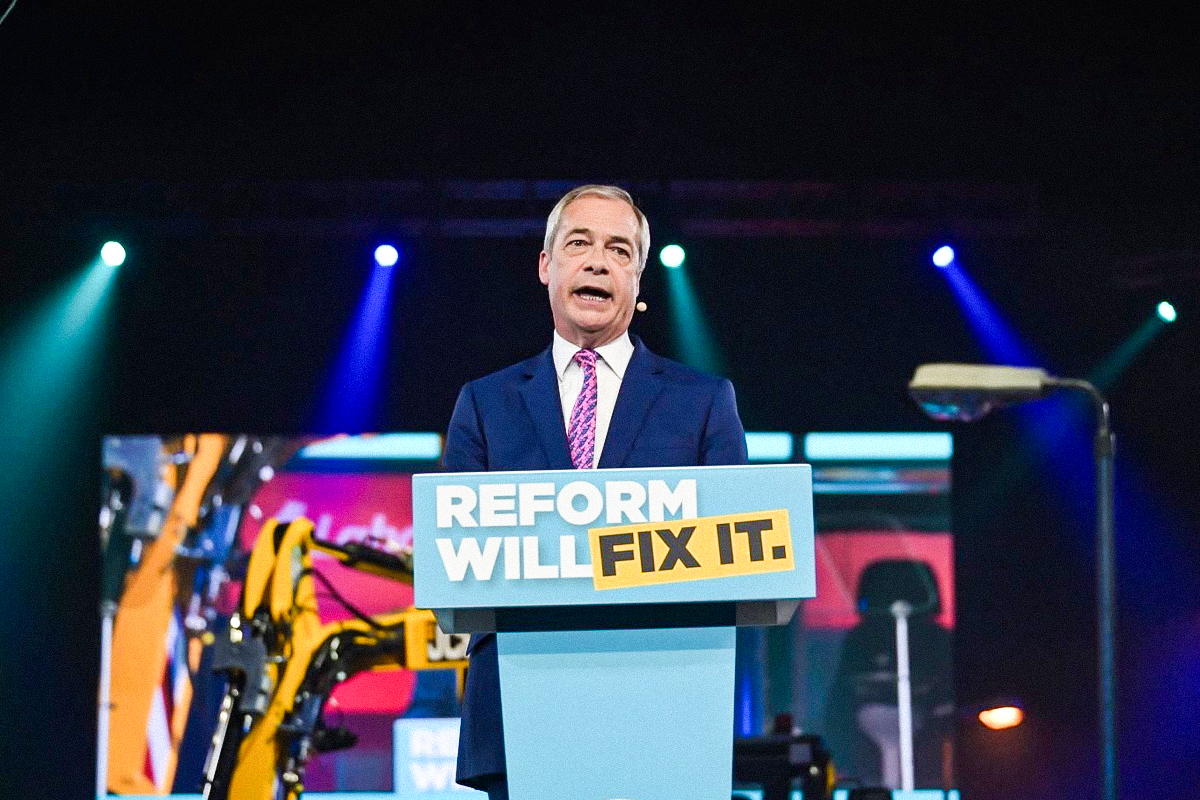“In despair, the young are turning towards communism.” So laments columnist Seb Payne, writing in The Sunday Times.
This establishment hack warns that without a “viable capitalist alternative”, such ideas will “enjoy a moment in the sun”.
But it’s capitalism – not communism – that has already had its moment in the sun. Now it has shrivelled into dust, having burnt through the last of its historical legitimacy.
Payne dutifully repeats the tired old line that capitalism and “democracy” are the “best, tried and tested way to have a prosperous nation”.
But where is this “prosperous nation”? Members of Gen-Z are certainly not listed among its citizens.
And where, too, is this fabled “democracy”? There was little to be found on Parliament Square earlier this month, when over 500 protestors were arrested on charges of ‘supporting terrorism’ – all for opposing ‘our’ government’s genocidal actions.
In the real world, Britain is neither democratic nor prosperous. Look outside your window: malnourished children, collapsing public services, shit in the rivers and waterways… this is Britain in 2025; these are the fruits of their ‘best system’.
Scroll through TikTok and you can get a sense of the despair:
@financialtimes Are you hanging out with other people enough? Young people may not be. People in their teens and twenties now hang out about as much as someone 10 years older than them did in the past. Until recently, the evidence on loneliness was weak at best, but surveys that previously showed it declining among US high school seniors now show steep climbs. In the UK and Europe, new data published in 2024 shows a marked rise in loneliness among people in their twenties. This mirrors patterns in socialising, or rather the lack thereof. The share of young people on either side of the Atlantic who regularly meet up socially with friends, family or colleagues has dropped sharply. In Europe, the share who don’t even socialise once a week has risen from one in 10 to one in four. The last decade is a story of young people retreating from the pursuits that bring them the most fulfilment, and replacing them — consciously or otherwise — with pale imitations, says the FT’s John Burn- Murdoch. Head over to ft.com to read the full story. #data #social #hangout #friends #genz #genalpha #trends #lonely #society ♬ original sound – FinancialTimes
@thesashawhitney How the vast majority of millennials survived the great recession is actually quite simple and may help some Gen Z. #millennialsoftiktok #millennial #greatrecession #recession #survivingtherecession #forthegirls #your20s ♬ original sound – Sasha
“Gen-Z loneliness epidemic”
“How to survive a recession: Advice from millennials to Gen Z”
“After months of rejection I paid a witch to help me get a job interview”
Is it any wonder mystical thinking is rising? Since 2019, the share of young adults who believe in God has jumped from 22 percent to 45 percent.
When decent jobs, housing, and a livable planet seem as fantastical as miracles, witchcraft and mysticism can look more reliable than the job market.
The children of 2008
The children of the 2008 crash are now 17, standing on the cusp of adulthood. They have never experienced rising living standards – only austerity, precarious work, and the climate crisis. Those born just before them are coming of age radicalised, having seen through years of empty promises.
Today, more than 630,000 graduates – once told that education was their guaranteed ticket to success – are claiming Universal Credit (UC). Among those aged 16-24, 742,064 are on UC, while 987,000 are categorised as not in work, education, or training.
A generation of young people is being pushed through the humiliating ritual of the dole queue, trapped in exploitative or soul-crushing low-skilled work. The British ruling class has reared a lost generation.
The government has even suggested forcing 642,000 unemployed 16-24-year-olds into national service – presumably to fight in failed wars in Ukraine and prepare for more disastrous conflicts in the Middle East.
But they will have a hard time, considering imperialist wars have already exposed these young people to the decay and rot at the heart of Western imperialism.
Nothing that Britain’s ruling class represents is worth fighting for. More than a third of under-40s said they would refuse conscription in the event of a world war – even if Britain were facing imminent invasion!
Generation revolution
While some despair, others are looking for a radical way out. A new survey Generation Extreme has revealed that between 32 and 40 percent of young Brits have a positive view of communism.
But it’s not enough to call yourself a communist. To be a communist is to act – to organise with others, to study our history and our method, to master Marxism, and to train for the coming class battles.
This generation has already seen uprisings shake Egypt, Bangladesh, Sri Lanka, Greece, and now Serbia – often led by the youth – only to be pulled back into the suffocating grip of capitalist parties and institutions.
Yet, to the dismay of people like Payne, a new generation has emerged – open to communism – because there is no other way forward.
Next time, we refuse to simply watch history unfold. We will shape it.
In 1847, on the precipice of the first great wave of working-class revolutions, the young revolutionaries Karl Marx and Friedrich Engels declared: “We have nothing to lose but our chains, and a world to win!”
If you’re going to sixth form, college, university, or work, you face a choice: keep waiting for capitalism to give you a future it will never deliver; or join the fight to seize power, dismantle this system, and build a society worth living in.
Get organised with the Communists today.
The milestones we can’t afford
Ella Atkinson
A recent Financial Times article describes how young people are increasingly forced to delay major life milestones – marriage, homeownership, and even divorce – because of financial precarity.
For my husband and I, the step still out of reach is having children.
We no longer need to imagine what a society with no future looks like. It’s here. It’s when the present is so overwhelming that planning for the future feels like a luxury.
It’s when you come home from work exhausted to the marrow, and it takes everything just to cook, clean, and sleep – so you can do it all again tomorrow.
Meanwhile, a dusty paintbrush sits untouched beside a sealed can of paint in the room we’ve already named the nursery.
Bills rise. The food shop gets more expensive. Wages remain frozen. That’s if you’re lucky enough to even have a permanent contract.
No wonder so many people dread the idea of bringing a child into this chaos. More and more, we’re being forced to sacrifice our futures just to survive the present.
Yet right-wing rags like The Telegraph and The Spectator love to call our generation “entitled,” “selfish,” “lazy” – while we work some of the longest hours in the developed world. And for what? If not to build stable, secure lives, then who exactly are we doing all this for?
Look at the super-rich. Young couples postpone weddings they can’t afford, while Jeff Bezos rents out the whole of Venice for his. The children of the wealthy attend elite private schools while state schools crumble, and one in three children in Britain live in poverty.
Even after all our sacrifices, British capitalism is barely limping along. It’s not us who lack a future. It’s capitalism itself.
When we finally welcome children into our family, we’ll do so with the strength of our class behind us; and the determination to tear this rotten system down.
We have a future to win.
Workhouse or no house?
Elora Parocki, Wood Green
Scrolling on TikTok I came across a video of a segment hosted by Tom Swarbrick on LBC:
“It is more difficult to buy a property now than it was at the end of the Victorian Era.”
@lbc To the young people leaving the UK for Dubai or Perth: Tom Swarbrick gets it. #lbc #tomswarbrick #abroad #britain #uknews ♬ original sound – LBC
Not surprising.
It led me to reflect. In 1987, aged 24, my parents bought their first house for £34,000 with a combined income of £24,000. I am now aged 26, on a £32,500 salary, with no money saved and home ownership as remote to me as a trip into space.
In 1974, before Thatcher, the average house price was £10,027, compared with £265,000 today. Although this is an eye watering amount, it’s nothing compared to the average deposits, which have risen from £537 to £58,000 – an over 10,000 percent increase!
This makes even the first obstacle insurmountable, before factoring in 40-plus year mortgages, impractical shared ownership, and rent-to-buy schemes
Look, I did everything right. I got good A-Levels and went to the University of Bath to study Computer Science. I planned, made my choices based on what jobs would offer stable incomes for my future.
What I hadn’t considered was that the British ruling class did not have long-term plans! Instead they sought short-term profits, laying waste to industry and jobs, robbing any sense of stability from the generations to come.
My industry is making redundancies after redundancies. If I can’t rely on my income tomorrow, how can I ever plan to save for a deposit?
The mortgage-market crash in 2008 not only damaged future prospects of people buying houses, but it was bailed out by none other than the workers themselves. My parents’ flat came to be worth £24k, while their mortgage increased to £37k.
Capitalism has stripped us of many things, including the ability to purchase a house of our own. While as tenants we are thrown at the mercy of landlords, including those who sit on gilded thrones and the benches of our hallowed parliament!
The historical irony is that only a revolutionary upheaval will provide Gen-Z with the stability we need!
Out of the frying pan…
Dylan O’Connor, Leeds
The newest batch of graduates in Britain have entered the job market in the past month with the hopes of putting their hard-earned degrees to good use straight away.
After three-plus years of study and a mountain of debt, many graduates are jumping out of the frying pan and straight into the fire.

The number of jobs advertised for the newest cohort of graduates is down 33 percent from last year, according to Indeed. This is the lowest the figure has been since 2018. The UK is now the only country in Europe with fewer job openings available than before the pandemic.
The mainstream press like The Guardian and The Telegraph are pointing to AI as the sole reason. According to a survey by Prospects, 10 percent of graduates they surveyed said they had changed their career plans because of AI.
It’s true that AI is being used to optimise certain tasks and remove people’s labour from the equation to cut costs. But this is not the only thing that makes finding a job almost impossible in this country.
Britain is a rentier economy, a middle man that facilitates exchange in service of western imperialism. All that remains after this country has been gutted of the majority of its industry is jobs in finance, insurance, and similar sectors where very little, if anything, is actually produced.
Therefore, if your degree doesn’t fall into a very particular handful of subjects, chances are you won’t find a job in your chosen line of work.
AI is exacerbating this even further and leaving job-hunting graduates with two options: keep hunting until you get a job that’s relevant to your degree (which could take months, years, or never happen!), or settle for work in customer service, care, or retail.
The billionaires have defiled the British economy over the past few decades, and made it into a parasitic economy that produces nothing. Young workers can only tolerate this humiliation for so long.






